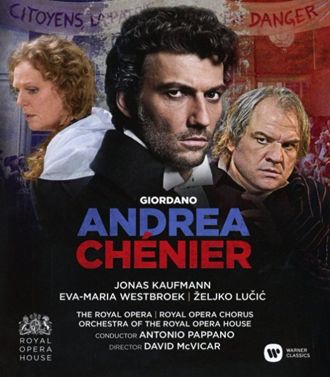|
|
|
|
|
|
|
|
|
Opera News, March 2017 |
| Patrick Dillon |
|
Andrea the Giant
|
 |
 HOW
NICE IT IS to see Andrea Chénier accorded its due! In the 1920s, when it
made its belated Met debut, it fielded casts boasting Gigli or Martinelli,
Muzio or Ponselle, de Luca or Ruffo. Revivals in the ’50s and ’60s offered
del Monaco, Tucker, Bergonzi and Corelli; Milanov, Tebaldi and Farrell;
Warren, Bastianini and Merrill. The twenty-first-century Met hasn’t been so
lucky, with some expert conducting (Levine, Noseda) overshadowing spotty
casting. HOW
NICE IT IS to see Andrea Chénier accorded its due! In the 1920s, when it
made its belated Met debut, it fielded casts boasting Gigli or Martinelli,
Muzio or Ponselle, de Luca or Ruffo. Revivals in the ’50s and ’60s offered
del Monaco, Tucker, Bergonzi and Corelli; Milanov, Tebaldi and Farrell;
Warren, Bastianini and Merrill. The twenty-first-century Met hasn’t been so
lucky, with some expert conducting (Levine, Noseda) overshadowing spotty
casting.
But Chénier is a singers’ opera, and a good conductor, no
matter how eloquent, can’t compensate for inadequate principals. Happily,
this Royal Opera House mounting, from January 2015—the company’s first in
three decades—offers both. Some critics couldn’t disguise a covert sneer at
the opera itself, even as they praised everything else about the musical
performance and David McVicar’s minutely detailed but never fussy
production. (There was a complimentary response to Chénier’s soprano-vehicle
counterpart, Cilèa’s Adriana Lecouvreur, in another McVicar staging, in
2010.) But their success wouldn’t have happened without Giordano, who
created a theatrically potent opera, dramatically terse but lyrically
expansive, with music that singers just love to sing.
That would be
clear of Jonas Kaufmann and Eva-Maria Westbroek even without their
enthusiastic endorsement in one of this release’s three bonus features.
These two, Met Wälsung twins—she an Elisabeth and Isolde, he a Lohengrin and
Parsifal—somehow seem happier in their Italian roles; though neither has a
genuinely Italianate timbre—the kind of juice-and-metal one hears in Corelli
and Tebaldi—they’ve fully mastered the Italian style, and they’re good
musicians, too. (Their sensuously caressed “Ora soave” in Act II illustrates
how this music should be performed.) They’re both in fine form, she with the
often blunt top notes more incisive than usual, he with his dynamic
self-indulgences reasonably checked. Under McVicar’s guidance—he rarely
fails to coax good acting from his singers—they’re utterly convincing as
this defiantly doomed pair of French Revolutionary lovers; and Željko Lučić,
the major onstage asset of the Met’s most recent revival, is better still
here, even if his lean, firm tone lacks the rounded heft of an ideal Carlo
Gérard.
In this handsome (and firmly in-period) staging, featuring
Robert Jones’s sets and Jenny Tiramani’s pitch-perfect costumes, all
contribute their best. The opera’s many vivid character roles are expertly
handled by Rosalind Plowright, all flighty hauteur as the Contessa di
Coigny; Carlo Bosi, as a sleazily scary Incredibile; and Jeremy White, a
grizzled everyman as the jailer Schmidt. Denyce Graves’s vibrant Bersi is
better seen than heard, but the veteran Elena Zilio makes an unforgettable
vignette of the old and blind Madelon’s sacrifice of her grandson.
|
|
|
|
|
|
|
|
|
|
|
|
|